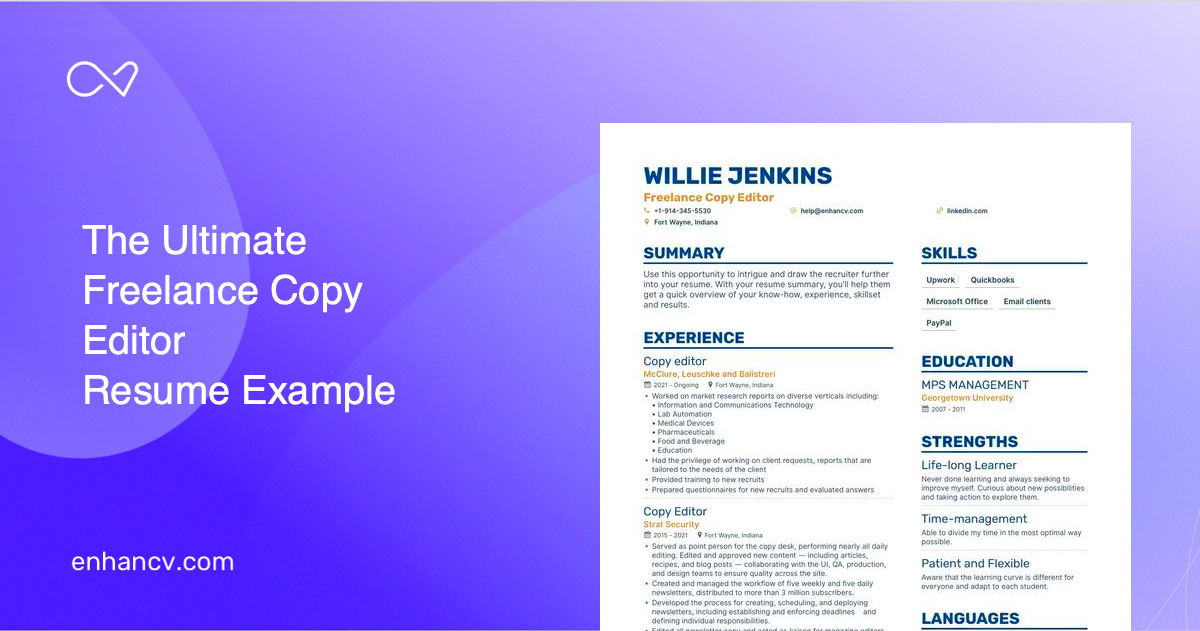Freelance copy editing is a rewarding career that allows you to work with words and help writers polish their content. As a copy editor, your job is to improve the clarity, accuracy, and overall quality of written materials. This field offers flexibility, allowing you to choose your projects and work from anywhere. If you enjoy reading and have a keen eye for detail, freelance copy editing might be the perfect fit for you.
Understanding the Role of a Copy Editor

A copy editor plays a crucial role in the writing process. Here are the key responsibilities:
- Reviewing Content: Check for grammar, punctuation, and spelling errors.
- Ensuring Clarity: Make sure the text is clear and easy to understand.
- Fact-Checking: Verify facts, figures, and statements to ensure accuracy.
- Maintaining Consistency: Ensure consistent style and tone throughout the document.
- Improving Flow: Enhance the overall flow and structure of the text.
In essence, copy editors are the last line of defense before content is published. They ensure that the final product is polished and professional.
Also Read This: How to Fix a Profile Image in Fiverr
Essential Skills Needed for Copy Editing

To succeed as a freelance copy editor, you need a specific set of skills:
- Strong Language Skills: A deep understanding of grammar, punctuation, and style is essential.
- Attention to Detail: Being detail-oriented helps catch errors that others might miss.
- Good Communication: Clear communication with writers is vital to convey edits and suggestions.
- Time Management: Freelancers must manage their time effectively to meet deadlines.
- Adaptability: Being flexible and open to different writing styles and formats is important.
Developing these skills can set you apart in the competitive freelance market and help you deliver high-quality work to your clients.
Also Read This: How to Become a Fiverr Freelancer
Finding Your Niche in Copy Editing
Identifying your niche in copy editing is essential for standing out in a crowded market. A niche allows you to specialize in specific areas, making you more appealing to potential clients. Here are some common niches you might consider:
- Academic Editing: Focus on research papers, theses, or dissertations.
- Business Editing: Work on reports, proposals, and marketing materials.
- Creative Editing: Edit novels, short stories, or scripts for authors.
- Website Content Editing: Polish online articles, blogs, and SEO content.
- Technical Editing: Work with manuals, guides, and technical documents.
To find your niche, think about your interests and expertise. What topics do you enjoy? What industries do you know well? By aligning your niche with your passions and strengths, you can attract clients who value your specific knowledge.
Also Read This: How to Get Your Money from Fiverr
Building Your Portfolio as a Copy Editor
Your portfolio is your calling card as a freelance copy editor. It showcases your skills and helps potential clients understand what you can offer. Here are some tips for building an impressive portfolio:
- Start with Samples: Include samples of your editing work, even if they are volunteer or personal projects.
- Diverse Formats: Showcase a variety of document types to demonstrate your versatility.
- Before and After: Include examples that show the original text and your edited version to highlight your editing skills.
- Client Testimonials: Add feedback from clients to build credibility and trust.
- Online Presence: Consider creating a personal website or using platforms like LinkedIn to display your portfolio.
Remember, your portfolio is a work in progress. Keep updating it as you gain more experience and complete new projects.
Also Read This: How to Can an Order After Delivery on Fiverr
Setting Your Rates and Finding Clients
Setting your rates as a freelance copy editor can be challenging but is crucial for your business. Here are some strategies to help you determine what to charge:
- Research Market Rates: Look at what other copy editors charge for similar services.
- Consider Your Experience: If you’re just starting, you may need to set lower rates to attract clients.
- Hourly vs. Project Rates: Decide whether you want to charge by the hour or per project. Each has its pros and cons.
- Value-Based Pricing: Consider the value you bring to clients and price accordingly.
Finding clients can be done through various avenues:
- Freelance Platforms: Websites like Fiverr and Upwork can connect you with clients looking for copy editors.
- Networking: Attend industry events or join online groups to meet potential clients and other professionals.
- Referrals: Ask satisfied clients for referrals to grow your client base.
Combining effective pricing strategies with active client outreach will help you build a successful freelance career.
Also Read This: How to Send Your Logo on Fiverr: A Step-by-Step Guide
Promoting Your Services Effectively
Promoting your freelance copy editing services is essential to attract clients and grow your business. Effective promotion involves various strategies that highlight your skills and reach potential customers. Here are some methods you can use:
- Create a Professional Website: Your website should showcase your portfolio, list your services, and provide contact information. It serves as a central hub for potential clients to learn about you.
- Utilize Social Media: Platforms like LinkedIn, Twitter, and Facebook can help you connect with writers and businesses. Share tips, insights, and updates about your services.
- Join Online Communities: Participate in forums and groups related to writing and editing. Engaging in discussions can help you establish credibility and attract clients.
- Network Locally: Attend workshops, conferences, and meetups in your area. Personal connections can lead to referrals and new clients.
- Offer Free Workshops: Consider hosting a free workshop or webinar on a topic related to copy editing. This showcases your expertise and can attract potential clients.
Effective promotion is about consistent effort. By combining these strategies and staying active in your outreach, you can build a solid client base and enhance your visibility as a freelance copy editor.
Also Read This: How to Sign Up for the Fiverr Affiliate Program
FAQ about Freelance Copy Editing
Here are some frequently asked questions about freelance copy editing to help clarify common concerns:
| Question | Answer |
|---|---|
| What does a copy editor do? | A copy editor reviews and revises written content for grammar, clarity, and overall quality. |
| Do I need a degree to be a copy editor? | While a degree can help, it is not always necessary. Strong language skills and experience are often more important. |
| How do I find clients as a freelance copy editor? | Use freelance platforms, network in writing communities, and promote your services on social media. |
| What are typical rates for freelance copy editors? | Rates can vary widely based on experience and niche, ranging from $25 to $100 per hour. |
| Can I work as a freelance copy editor part-time? | Yes, many copy editors work part-time alongside other commitments. |
These FAQs should help clarify some of the most common inquiries about starting your freelance copy editing journey.
Conclusion on Starting as a Freelance Copy Editor
Starting your journey as a freelance copy editor can be an exciting and fulfilling experience. By understanding your role, honing your skills, and effectively promoting your services, you can build a successful career. Remember, finding your niche and creating a strong portfolio are key steps in attracting clients. Don't hesitate to reach out and network with others in the industry, as connections can lead to new opportunities.
With dedication and effort, you can establish yourself as a trusted freelance copy editor. Stay open to learning and adapting as you grow your business, and soon you’ll find your place in the world of freelance editing.




